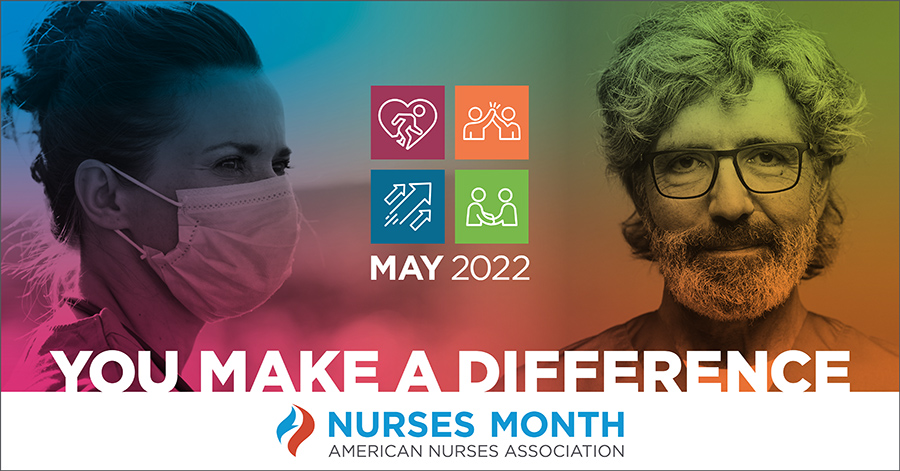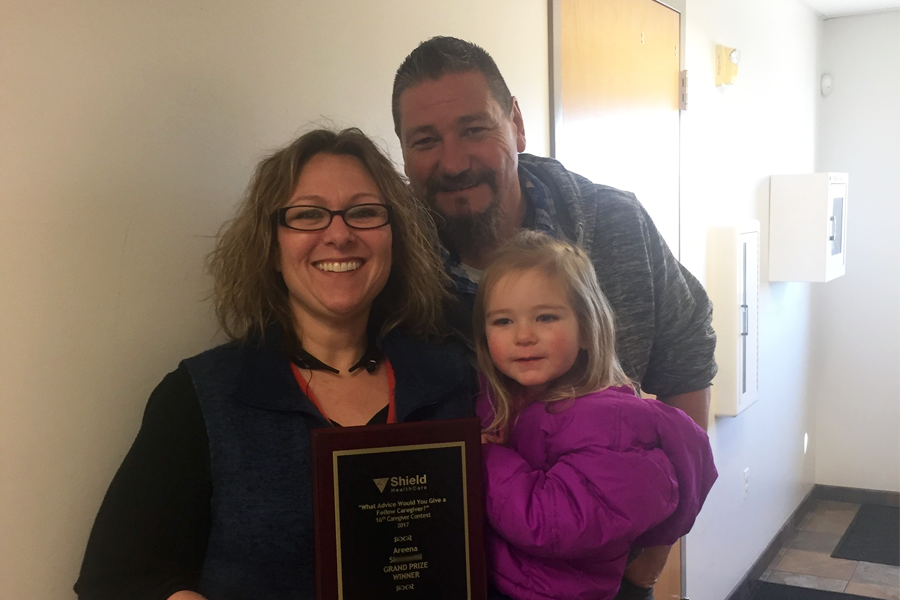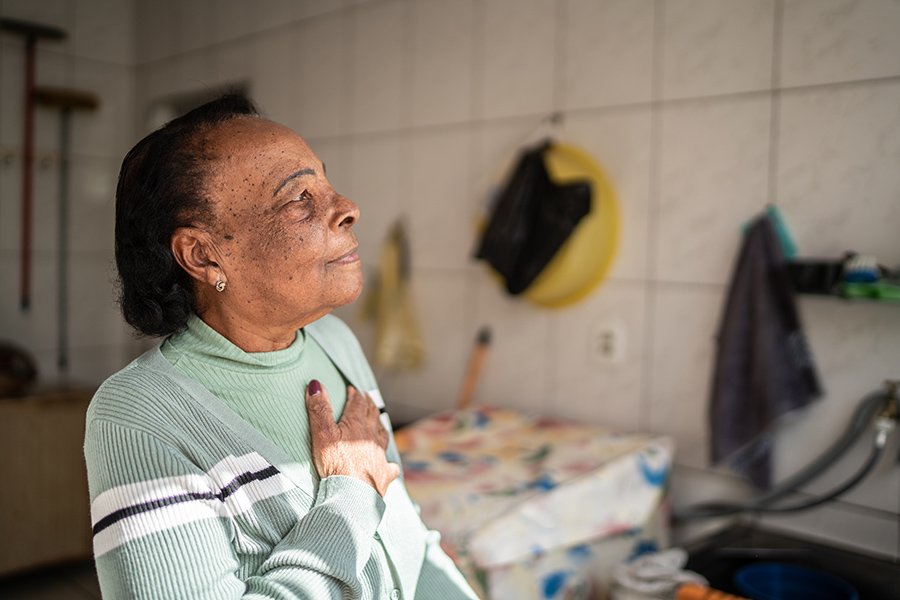Each May, we recognize both Nurse Appreciation Week (May 6 – 12) and National Nurses Month. This year’s theme, “You Make A Difference,” honors the vast contributions and positive impact of America’s nurses. We are all indebted to nurses for their unwavering commitment to patients, their communities, and our healthcare systems.
During the first waves of the COVID-19 pandemic, nurses put their own health at risk on a daily basis to treat patients under the most trying of circumstances. While virtually all healthcare workers were exposed, nurses who were in close contact with those sick with COVID-19 were at higher risk of exposure due to the frequency and intimacy of their patient interaction. Nurses spend more time providing up-close-and-personal patient care such as bathing, dressing, and administering medications, which cannot be done from 6 feet away.
For all they sacrifice, nurses deserve our sincere appreciation and gratitude. Each May, Nurse Appreciation Week gives us the opportunity to thank nurses on behalf of the individuals, communities, and healthcare systems they serve.
Six Facts About the Nursing Profession
- Nursing is considered the most honest and ethical profession in the United States
For the 20th straight year, nurses lead Gallup’s annual ranking of professions for having high honesty and ethics, eclipsing medical doctors – who are in second place – by 14 points (81% vs. 67%). Grade-school teachers (64%), pharmacists (63%) and military officers (61%) round out the top five most respected professions in this year’s list. - Registered Nursing is listed among the top occupations in terms of job growth through 2029
According to the Bureau of Labor Statistics’ Employment Projections 2019-2029, the active RN workforce is expected to grow from 3 million in 2019 to 3.3 million in 2029. That’s an increase of 221,900, or 7%. (In addition, there are nearly 700,000 inactive RNs in the U.S., who are either retired or not active in nursing.) - There is a projected shortage of Registered Nurses in the U.S.
A shortage of registered nurses is projected to spread across the country between 2016 and 2030. In a state-by-state analysis published in the May/June 2018 issue of the American Journal of Medical Quality, the authors forecast the RN shortage to be most intense in the South and the West. - Nurses don’t always work in hospitals
While about 60 percent of nurses work in hospitals, nurses also work in a variety of other settings. These might include doctor’s offices and outpatient care centers; in nursing homes and residential care communities; at government agencies; and in schools or educational services. - Nurses can gain their Doctorate as well as become doctors
Nurses can obtain a Doctorate of Philosophy in Nursing (Ph.D.), which is a research-focused doctorate, or a Doctorate in Nursing Practice (DNP) that is the highest available degree in nursing. In this sense, nurses can be called “Dr.” Some practicing nurses also pursue an MD degree and become doctors after achieving their Bachelor of Nursing. - Nurses walk an average of 4 to 5 miles in a 12-hour shift
A 2006 study found that nurses walk 4 to 5 miles (8,000-10,000 steps), burning over 1,400 calories in a 12-hour shift. By comparison, according to 2020 research from the Walking Behavior Laboratory at Pennington Biomedical Research Center, the typical American takes about 5,900 steps a day.
Have You Heard of These Famous Nurses?
Nurse Appreciation Week begins each year on May 6, National RN Recognition Day, and ends each year on May 12, Florence Nightingale’s birthday. Thanks to Florence Nightingale’s strict hygiene practices while caring for wounded soldiers in the Crimean War, she is considered one of the founders of modern nursing.
Have you heard of the nurses below?
- Florence Nightingale ushered in the modern era of nursing.
Among her innovations were holding health care teams accountable for the quality of patient care, implementing sanitary conditions such as handwashing and bathing, and emphasizing the need for compassionate, patient-centered care. “The Lady with the Lamp” also helped shape the uniform used by nurses, particularly the cap. In 1860, she established Nightingale Nursing School, a school for nurse training. - Clara Barton, the “Angel of the Battlefield.”
Clara Barton was called the “Angel of the Battlefield” for her work as a nurse during the Civil War treating soldiers on both sides of the conflict. After the war, Barton met with Henry Dunant, who founded the International Red Cross in 1863, and championed the establishment of the American Red Cross in 1881. - Dorothea Dix and the mentally ill.
Dorothea Dix served as superintendent of Army nurses during the Civil War. Prior to that, she brought attention to the plight of mentally ill prisoners and worked to improve living conditions for people with mental illness. - Linda Richards was the first person to earn a nursing diploma in the U.S.
Linda Richards was the first professionally trained American nurse. She enrolled in the new nursing program at the New England Hospital for Women and Children, was the program’s first graduate in 1873, and established nursing training programs in the United States and Japan. She is also considered the inventor of written patient records. - Mary Eliza Mahoney was the first African American nurse.
Born in Boston in 1845 to parents of freed slaves who had moved from North Carolina, Mary Eliza Mahoney was educated at one of the first integrated schools in the U.S. She began working for the New England Hospital for Women and Children while still in her teens, and she enrolled in the hospital’s rigorous professional graduate school of nursing in 1878. Of the 42 students that entered the program that year, only four completed it – Mary Eliza Mahoney was one of those four students.
Sources:
- nursesmonth.org/
- news.gallup.com
- nurse.org/articles/career-advancement-rn-to-md/
- www.ncbi.nlm.nih.gov/pmc/articles/PMC4557413/
- lineusmed.com/new-blog/are-nurses-caring-for-themselves
- www.businessinsider.com/heres-how-much-the-average-american-walks-every-day-2015-7
- www.bls.gov/ooh/healthcare/registered-nurses.htm
- mhanational.org/mental-health-healthcare-workers-covid-19
- www.latimes.com/science/story/2020-10-27/among-healthcare-workers-covid-19-hardest-on-nurses
- www.aacnnursing.org/news-information/fact-sheets/nursing-shortage
- online.norwich.edu/academic-programs/resources/national-nurse-week























